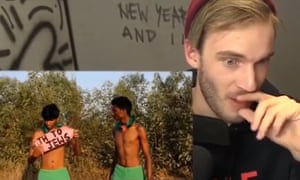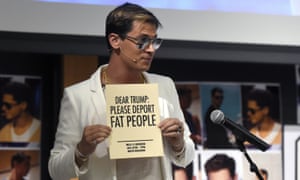Our greatest peril? Screening ourselves off from reality
Immersed in life online like the followers of 4chan or PewDiePie, we start to imagine that nothing matters – even racism, misogyny and resurgent fascism
Everything is possible. Nothing is possible. Nothing hurts any more, until the consequences crash through the screen. Immersed almost permanently in virtual worlds, we cannot check what we are told against tangible reality. Is it any wonder that we live in a post-truth era, when we are bereft of experience?
It is no longer rare to meet adults who have never swum except in a swimming pool, never slept except in a building, never run a mile or climbed a mountain, never been stung by a bee or a wasp, never broken a bone or needed stitches. Without a visceral knowledge of what it is to be hurt and healed, exhausted and resolute, freezing and ecstatic, we lose our reference points. We are separated from the world by a layer of glass. Climate change, distant wars, the erosion of democracy, resurgent fascism – in our temperature-controlled enclosures, all can be reduced to abstractions.
I’m prompted to write this for two reasons. The first is a fascinating and disturbing explanation of the bulletin board 4chan.org by one of its former inhabitants, Dale Beran. This is the forum in which many of the far-right’s toxic memes grew, and whose vicious pursuit, through Gamergate, of women who have dared to develop videogames rose into a new wave of misogyny. Its millions of members helped to put Donald Trump on the throne.
Is 4chan a clever invention from a group of fascist conspirators? No. It evolved organically among young, often jobless, often sexually frustrated men, who sought refuge in a world of their own making, and live there through almost every waking hour. As their online world of ironic self-reflection expanded, their contact with the real world shrank, until nothing was serious – except their hatred of women. Depicting their mascot Pepe the frog in a Nazi costume, giving the finger to liberals and people of colour, is just a joke. So was the rise, on their shoulders, of Milo Yiannopoulos. So was the election of Trump.
Like adolescent boys and man-boys everywhere, 4chan’s users, Beran explains, are “deeply sensitive and guarded”. They disguise this sensitivity with extreme insensitivity to other people’s suffering – of the kind that “only people who have never really suffered” can display. Whatever they do or say – posting swastikas, racist memes, incitements to bully and abuse – is just “for the lulz” (4chan’s word for laugh out loud).
None of it, in the airless, affectless world in which they spend almost all their time, seems to matter. When they make the mistake of stepping into the real world as Laurie Penny’s description last week of the young men accompanying Yiannopoulos on his roadshow reveals, they find it a hard and terrifying place. “Very brave behind a computer screen”, these people are “absolutely unequipped to deal with any suggestion of real-world consequences”, she wrote. Until they collided with anti-fascist demonstrators, their far-right politics were just more lulz. Beran explains that Trump perfectly encapsulates the 4chan ethic. A loser who miraculously wins, a great spiteful prank on the world’s people, he brings its fantasy world to life.
My second reason for writing this column is that the same issues surround another online sensation: the output of the YouTube vlogger PewDiePie. His absurdist babble, adored by his 53 million mostly teenage followers, evolved into giving a Nazi salute, inserting clips of Hitler’s speeches and images of swastikas into his shows, paying two Indian men to hold up a sign reading “DEATH TO ALL JEWS”, and pondering whether Leslie Jones (the actor who was brutally bulliedby Yiannopolous and his followers for the crime of being black and female in a public place) should be compared to Harambe the gorilla
Several people have explained to me that it was all just fun; he didn’t mean it. Which, to my mind, is exactly the problem. When the Holocaust, Nazism and racism are all so abstracted from reality that they become just another expression of ironic detachment; when moral norms collapse into knowing laughter – our defences against offline horrors disintegrate.
Breaking down the barriers of acceptability through humour is now a deliberate tactic of the far right. PewDiePie might see his “jokes” as harmless and fun, but they mesh with agendas that are neither. The Nazi website the Daily Stormer notes that PewDiePie “could be doing all this only to ... stir things up and get free publicity. Ultimately, it doesn’t matter, since the effect is the same; it normalizes Nazism, and marginalizes our enemies”.
The shrinking of our contact with the tangible world has taken place at a speed to which we struggle to adapt, with consequences we cannot yet grasp. The outdoor childhoods – urban or rural – that people of my age enjoyed are seen by our children in the same light as extinct mastodons and public hangings: exotic, frightening and impossibly distant. For those who still see the rainbow arcing over the town while everyone else is buried in their phones, life in the real world can feel lonely.
I suspect this has only just begun. Virtual reality is in its infancy. Once people retreat into the land behind the headset, in which they can no longer even see or hear what surrounds them, they are likely to become still less connected with the real world. Facebook’s attempt to make virtual reality goggles an indispensable tool for learning, watching sport, even consulting a doctor explained this week by the author Adam Alter,, is frankly terrifying. It threatens to turn almost everyone into what the Japanese call hikikomori - people who have withdrawn so far into virtual worlds that they can no longer be reached by those around them.
This makes us, especially in view of advances in neuromarketing and cognitive linguistics that are now being ruthlessly exploited by the hard right, highly vulnerable to political manipulation. In a fiendishly complex world, the only hope we have of assessing competing claims is often to draw on our own experience. Without experience, we are lost.
This is more fundamental even than filter bubbles. This is about what it is to be human, what it is to lose that essential element of our existence: our contact with the real world. The political, social and environmental consequences are currently beyond reckoning.
A fully linked version of this column will be published on monbiot.com






Geen opmerkingen:
Een reactie posten